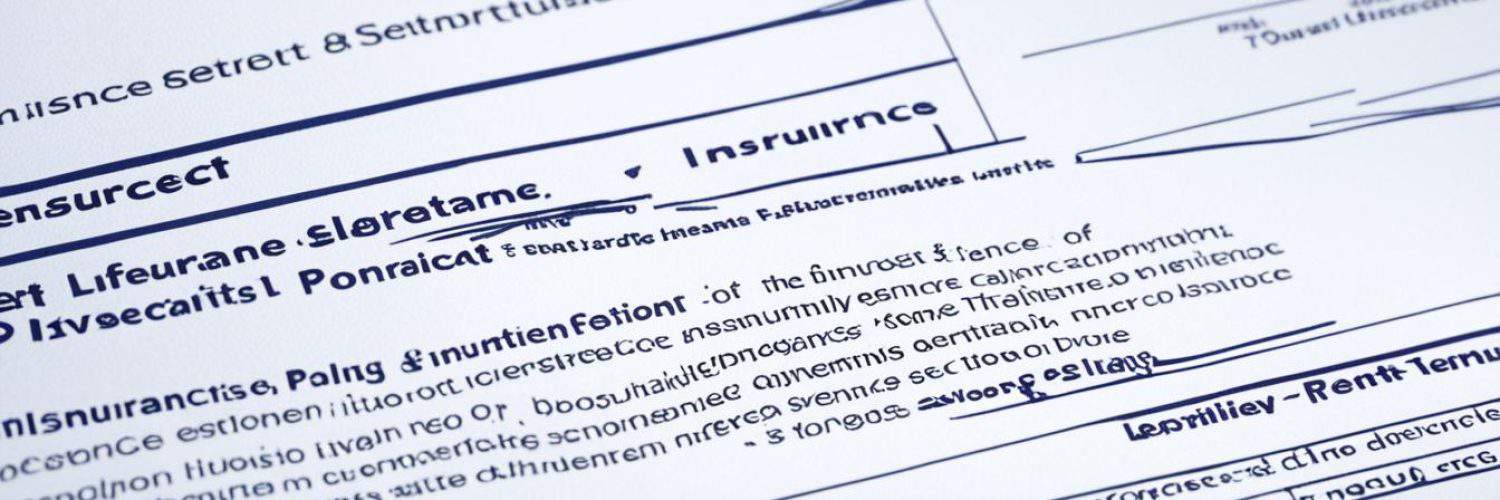Divorce can be tough and emotional, but it’s key to sort out your finances. This includes looking at how divorce affects your life insurance and who gets the benefits. Knowing the rules about life insurance after divorce can ease your mind and protect your family’s future.
Key Takeaways
- Life insurance may be needed after divorce if a court says so, with your ex as the beneficiary1.
- Permanent life insurance with cash value is often seen as shared property, but term life insurance is usually not1.
- A judge might order life insurance policies with your ex as the beneficiary for financial support after the divorce1.
- In most states, a divorce cancels pre-divorce beneficiary choices, affecting life insurance and retirement plans2.
- It’s important to update who gets your life insurance and retirement plans after divorce to make sure your wishes are followed.
Dealing with life insurance and divorce can seem hard, but the right advice can help. You can make sure your policy fits your new financial situation and family needs. By knowing the main rules and what to consider, you can protect your loved ones and secure your financial future.
Introduction: Life Insurance and Divorce
Divorce can change many financial and legal aspects, and life insurance is key in this process3. Life insurance policies, especially who they are given to, might need updates after a divorce3. It’s important to review and adjust life insurance to match new marital status.
Divorce Can Impact Life Insurance Policies
Divorce can greatly affect life insurance3. Since 1999, court cases have made it clear how life insurance fits into divorce, often tied to child support and alimony3. In Florida, courts can order life insurance to ensure support payments if needed3.
If you don’t update life insurance after divorce, it could still go to your ex3. There can be disagreements over who gets life insurance money after an ex’s death3. A Florida judge pointed out the need for clearer laws on life insurance in divorce cases3.
The Importance of Reviewing Beneficiary Designations
It’s vital to check life insurance who-to’s after a divorce4. Over 40 states have laws that change beneficiaries on things like IRAs and insurance policies when a couple divorces4. But, ERISA laws don’t automatically change beneficiaries on certain retirement plans4. Questions can come up about survivorship benefits in property settlement agreements4.
Life insurance rules after divorce can be tricky and differ by state5. In 2002, Minnesota made a law that cancels any life insurance choices made to an ex after a divorce5. The Supreme Court said this law was okay under the Constitution5.
Changing life insurance beneficiaries is key in divorce, affecting money matters for exes and kids. It’s wise to get help from lawyers and financial experts to follow state laws and protect everyone’s interests345.
Do You Need Life Insurance After Divorce?
Going through a divorce makes thinking about life insurance very important6. Divorce can change how partners handle money, affecting both short and long-term goals6. Life insurance is key to keeping financially safe after divorce, especially if there are kids6. Whether you need life insurance after divorce depends on your divorce agreement and your situation6.
Personal and Legal Reasons for Maintaining Life Insurance
There are personal and legal reasons to keep life insurance after divorce6. Sometimes, courts order life insurance to make sure money is paid for things like alimony and child support7. The court can decide who owns the insurance, who gets the money if something happens, and who pays for it6. Having enough life insurance after divorce is key to keeping kids safe financially if something unexpected happens6.
Consulting Legal and Financial Advisors
Getting advice from legal and financial experts is crucial when dealing with life insurance after divorce6. In the U.S., courts usually don’t let you keep a life insurance policy on an ex after divorce7. Some divorce agreements require the working spouse to have life insurance to support the family7. It’s smart to figure out how much coverage you need by multiplying the years until your child grows up by your income7. Experts say it’s good for ex-spouses to have life insurance to protect their kids and help with money problems7.
Talking to experts helps make sure your life insurance meets your personal and legal needs, keeping your family safe during and after divorce8.
“It’s important to talk to a divorce lawyer before changing life insurance to follow the law and avoid breaking divorce agreements.”8
life insurance beneficiary rules after divorce
After a divorce, your life insurance policy’s beneficiary can change. The rules depend on your divorce agreement9. If you owe alimony or child support, a court might say your ex must still be the beneficiary9. It’s key to know these rules and how they affect your policy.
Court-Ordered Beneficiary Requirements
Some divorce agreements say your ex must stay the policy’s beneficiary9. This is true if you owe alimony or child support9. The court does this to make sure your ex and any kids are financially supported9.
Alimony and Child Support Considerations
If your divorce decree says keep your ex as the beneficiary, you must follow it9. Not doing so could lead to legal trouble and risk your ex’s and kids’ financial well-being9. Always check your divorce decree and talk to legal and financial experts to make sure you’re doing the right thing.
You can’t just remove your ex from your policy without your divorce agreement saying so9. Sometimes, the decree won’t automatically change your policy’s beneficiary9. Always talk to a lawyer to know your rights and what’s best for you.
“Permanent life insurance, such as whole life insurance, with cash value represents marital assets that may need to be divided among ex-spouses in a divorce.”9
Knowing the rules about beneficiaries and support can help you manage your life insurance after divorce91011. This way, your policy will match your new financial situation and keep your family safe.
Removing an Ex-Spouse as Beneficiary
After a divorce, you might be able to take your ex off your life insurance policy. But, this can be tricky and needs careful thought. It’s key to talk to a lawyer before changing who gets your policy after you’re gone.
Consulting a Lawyer for Life Insurance Beneficiary Changes After Divorce
In states like Alabama, Alaska, Arizona, Colorado, Florida, and others, revocation-upon-divorce laws kick in after a divorce. They remove an ex-spouse from life insurance policies automatically12. Ohio, Pennsylvania, South Dakota, Texas, Utah, and others also have laws that do the same thing after a divorce12.
But, even in these states, people who think they should get the life insurance money can try to claim it through an interpleader process12. These cases are usually hard to win12.
Under Federal ERISA law, a divorce doesn’t change who gets group life insurance. This law takes over state laws12. So, even if you get divorced in a state that automatically removes your ex, they stay the beneficiary if you don’t update the policy after the divorce.
In some states, there are steps to take if you want to remove your ex as a beneficiary, especially if you owe child or spousal support12. In places that are community property states, your ex might get part of the life insurance money if you paid for it during the marriage12.
Because of all these rules, it’s best to consult a lawyer before changing your life insurance after a divorce12. A lawyer can help you follow the law and make sure you’re doing what you’re supposed to do.

With a lawyer’s help, you can make sure your ex isn’t on your life insurance policy anymore. This is important for your own money and for your family’s future if something happens to you12. It’s a key step to keep your finances safe.
Life Insurance Policies and Marital Assets
When you’re going through a divorce, knowing how life insurance policies work is key13. These policies, especially those with cash value, are often seen as shared assets13. The cash value in policies like whole or universal life can be split fairly during a divorce.
How life insurance is handled in a divorce changes with each state’s laws14. In New Jersey, for example, couples must list all insurance policies at the start of a contested divorce14. This ensures a fair split of all assets, including life insurance.
Cash Value in Permanent Life Insurance Policies
The cash value in permanent life insurance is a big deal in divorces13. Courts often split this cash value fairly between the spouses13. But remember, there might be surrender charges that affect the final share.
State Laws and Asset Division Rules
State laws are key in dividing assets like life insurance in a divorce14. Some states see term life insurance as separate, but cash value policies as shared assets14. Always talk to a lawyer to understand how your state’s laws affect your policies.
Dividing life insurance in a divorce is complex. It’s crucial to work with legal and financial experts for the best outcome15. Knowing the laws and your policy details helps you make smart choices for your future151314.
Buying Life Insurance on an Ex-Spouse
In some cases, buying life insurance on an ex-spouse is needed or smart. This is true if the divorce decree says the ex-spouse must pay alimony or child support16. The court might also say one or both ex-spouses must keep life insurance to make sure these payments are made16.
Reasons for Insuring an Ex-Spouse’s Life
One main reason to insure an ex-spouse’s life is to protect income for alimony and child support after divorce16. Financial experts might suggest getting life insurance on the ex-spouse to cover these payments if they were to die16. Also, a divorce might mean changing who gets the life insurance money, which could mean updating wills and policies16.
Court-Ordered Life Insurance Requirements
The court might tell one or both ex-spouses to keep life insurance to protect money owed, like alimony and child support16. In places like Pennsylvania, if a divorce ends without saying who gets the life insurance, each ex-spouse loses their right to the policy17.
Buying life insurance on an ex-spouse usually means showing you have a reason to insure them and getting their okay18. But, you might not be able to buy a policy if you can’t show you have a reason or if the ex-spouse won’t agree18.
The cost to insure an ex-spouse changes based on the type of insurance, how much coverage, and the ex-spouse’s health, age, and lifestyle18. A 10-year, $250,000 policy for a 30-year-old man in good health costs about $10 to $15 a month18. Some insurers might ask the ex-spouse to have a health check before giving out a policy. Policies without exams are usually more expensive and might not cover as much18.
Remember, a life insurance policy on an ex-spouse stays active no matter their marital status or child support changes18. Term life insurance ends after a certain time, but whole life insurance doesn’t and grows in value over time18.
If the life insurance is part of a job benefit under the federal ERISA, the plan rules decide who gets the money, not state laws17. But, for policies bought on your own, state laws, like in Pennsylvania, take over after a divorce17.
“The legal fight over the life insurance policy went all the way to the Pennsylvania Supreme Court. It was decided that under ERISA, the plan rules decide who gets the money in job benefits.”17
It’s key to talk to legal and financial experts when dealing with life insurance on an ex-spouse. The rules and effects can change a lot based on where you live and the type of policy.
Court-Ordered Life Insurance
If your divorce decree says you need life insurance, it’s key to get coverage fast and show proof to the court6. The decree will outline the coverage details, who gets the money if you die, and when you need to get the policy19. Not following these rules can lead to big legal problems.
Satisfying Divorce Decree Requirements
When the court says you must have life insurance after divorce, act quickly to get the policy19. The court might want you to have a certain amount of coverage, like for child support or alimony19. It might also say your ex or your kids should get the money if you die. Following these rules is key to avoiding legal trouble later.
Providing Proof of Coverage
After getting the life insurance, you must show proof to the court6. This means sending in things like your policy details, who gets the money, and proof you’re paying premiums19. Keeping this proof safe is important because the court might ask for updates to make sure you’re following the divorce decree.
Dealing with court-ordered life insurance can be tough, but it’s vital for your family’s money safety and to avoid legal trouble6. Getting help from a skilled legal and financial advisor is a good idea. They can make sure you’re doing what you need to do and protect your interests.
The court is serious about these rules, and not following them can lead to fines or even being charged with contempt of court19. By being careful and getting the right help, you can meet your life insurance duties. This way, you’ll make sure your loved ones are financially secure20619.
Naming Children as Beneficiaries
After a divorce, you might think about naming your kids as your life insurance policy’s beneficiaries. But, it’s usually not a good idea to name minors directly because the money could get stuck in court until they turn 1821. Instead, think about naming a trusted adult or setting up a trust to handle the money for your kids22.
Considerations for Minor Beneficiaries
Adding minor kids as life insurance beneficiaries can be tricky. In most places, kids become adults at 18, but in Alabama, Nebraska, and Mississippi, it’s 19 or 2122. The insurance company might need to find a guardian or trustee if a minor is the beneficiary, which can slow things down22.
To avoid these delays, setting up an irrevocable life insurance trust (ILIT) or choosing a custodian can help. This way, the money can get to your child faster and be used for their benefit22.
Using Trusts and Custodians
Trusts and custodians are great for managing life insurance money for minors. By picking a trust, you can decide how the money is used and when your child gets it21. Or, you can pick a custodian to watch over the money until your child is old enough, then they get it all22.
Single parents might not have to share the life insurance money with the other parent unless it’s in a divorce agreement22. But, make sure to check your policy and talk to a lawyer to make sure your wishes are clear and legal.

When choosing life insurance beneficiaries, think about your family’s specific situation. Work with legal and financial experts to make sure your kids are protected and cared for212322.
Updating Beneficiaries and Ownership
After your divorce, make sure to update your life insurance policy’s beneficiaries. This ensures your coverage matches your new status and any court orders. You also need to think about who owns the policy, as this affects who can change it later2425.
Changing Beneficiary Designations
Divorce changes your life insurance policy, so update the beneficiaries fast. You can’t change who gets the money until the divorce is done25. After it’s finalized, check your policy and change the beneficiary to remove your ex25.
Remember, just because you’re divorced doesn’t mean your ex won’t get the life insurance money if you die25. You must update the beneficiaries yourself to avoid this25.
Policy Ownership Considerations
You might also need to think about who owns the life insurance policy24. In some states, your ex could still have a claim to the policy, even if they’re not the beneficiary24.
In California, everything you buy during the marriage is shared24. If you paid for the policy together, your ex could get part of the money if you die, even if they’re not the beneficiary24.
It’s smart to talk to a lawyer to know the rules in your state about life insurance after a divorce24257.
“Regular reviews of beneficiary designations are advised throughout one’s lifetime to ensure they are up to date and aligned with current circumstances.”25
Single Parenthood and Life Insurance
After a divorce, one parent often takes on the role of sole caregiver for their kids. It’s vital for this parent to have enough life insurance to protect their children’s financial future if they pass away26. Figuring out the right coverage amount is key, considering things like income replacement and the kids’ needs26.
Protecting Children’s Financial Future
Whole life and universal life policies offer a death benefit and grow in value over time26. Term life insurance, however, doesn’t build cash value but is cheaper26. If there’s no life insurance, getting a new policy can ensure your kids are taken care of if you’re not there26. It’s important to think about child support and spousal maintenance when deciding on life insurance26.
Calculating Adequate Coverage Amounts
Child support and spousal maintenance payments affect how much life insurance you need26. Naming the custodial parent as the policy’s beneficiary helps keep the kids secure26. It’s smart to consider life insurance for both parents to cover for any eventuality26. Many choose to buy more life insurance than just for support, using it for estate planning to secure their kids’ future26.
Life insurance gives peace of mind to single or custodial parents after a divorce, offering tailored policies for their unique situations26.
“Life insurance is crucial for single parents post-divorce to protect children’s financial future, with policies recommended to replace alimony or child support until children reach adulthood.”27
Divorce can be tough, but making sure your kids are financially secure is a top priority. Life insurance is a key tool for single parents to protect their family’s future. It brings peace of mind and the resources needed to care for their loved ones.
Dividing Life Insurance Cash Value
When you’re getting a divorce, the cash value of life insurance policies is key. Policies like whole and universal life build up cash value over time. This makes them an asset that might be split fairly during the divorce1. Term life insurance, however, doesn’t have cash value and isn’t seen as a marital asset1.
Equitable Distribution of Marital Assets
The court looks at life insurance cash value when dividing assets, trying to split them fairly between spouses1. Sometimes, cashing out the policy is the easiest way to split the money1. But, talking to legal and financial experts is key to getting the best outcome for you.
If there’s court-ordered support like alimony or child support, a judge might say the ex-spouse stays the policy’s beneficiary1. This ensures the ex-spouse and any kids are taken care of if the policyholder dies.
Cashing Out Policies
Cashing out life insurance during a divorce can be a good move, but think about the tax effects and your finances later on28. Check your policy details and talk to insurance agents or companies to see your options, like partial withdrawals or borrowing against the cash value, to keep coverage after the divorce28.
Remember, how life insurance is divided in a divorce changes by state28. A lawyer who knows divorce law and financial planning can guide you through this complex stuff and help you make smart choices for your situation29.
Knowing how life insurance fits into divorce and the choices you have can help protect your money and make the transition smoother29.
Working with Attorneys and Financial Advisors
Dealing with life insurance during a divorce can be tough30. It’s key to work with divorce attorneys and financial advisors who know their stuff. They help you know your rights, make smart choices, and avoid tax issues with your life insurance.
Navigating Legal Complexities
Divorce brings up many legal issues with life insurance30. It’s vital to plan for the future because courts decide how to split your stuff30. If one spouse dies during divorce, things get even trickier, moving from family court to probate court.
Getting advice from a divorce lawyer is crucial for handling life insurance30. During divorce, you can’t move, borrow against, or sell property without okay from your ex30. You also can’t cash out life insurance, borrow against it, change who owns it, or get rid of it.
Minimizing Tax Implications
Changing life insurance during or after a divorce can affect your taxes9. Whole life insurance might be seen as shared property that needs to be split9. Keeping your life insurance can keep your family safe if something unexpected happens. It also lets you update who gets the policy if needed.
Financial advisors can guide you through the tax issues of changing life insurance30. You can change or cancel a will, or take away someone’s right to property during divorce30. Knowing these rules can help you avoid big tax problems during divorce.
Working with legal and financial experts helps you handle life insurance during divorce31. They help you make smart choices and protect your money31. Good estate planning and knowing your financial duties in divorce are key. That’s why it’s important to work with skilled advisors for a smooth move ahead.
Conclusion
When dealing with life insurance after a divorce, it’s key to protect your assets and dependents. With nearly half of all marriages ending in divorce in the U.S32., it’s vital to check your life insurance policies. Make sure your beneficiaries match your current wishes and legal needs.
Working with legal and financial experts helps you make smart choices. You can update your life insurance and follow any court orders. Remember, getting new life insurance won’t affect the total coverage32. But, who gets the money can change a lot.
If you’re going through a divorce or have already been through it, review your life insurance. This way, you protect your assets and make sure your loved ones are cared for if something happens to you. By staying informed and taking action, you can handle life insurance rules after a divorce. This ensures a secure financial future for you and your family.
FAQ
How can divorce impact life insurance policies?
Why is it important to review beneficiary designations after a divorce?
Do I need to maintain life insurance after a divorce?
How do the life insurance beneficiary rules work after a divorce?
Can I remove my ex-spouse as the beneficiary of my life insurance policy?
How are life insurance policies treated as marital assets during a divorce?
Can I be required to purchase life insurance on my ex-spouse after a divorce?
What are the key considerations for naming my children as life insurance beneficiaries after a divorce?
How do I update the beneficiary designations and ownership of my life insurance policy after a divorce?
How should a single parent approach life insurance coverage after a divorce?
How is the cash value of life insurance policies divided during a divorce?
What role do attorneys and financial advisors play in navigating life insurance during a divorce?
Source Links
- https://www.progressive.com/lifelanes/turning-points/life-insurance-beneficiary-rules-after-divorce/
- https://www.apa.org/monitor/2019/01/jn
- https://lawpublications.barry.edu/cgi/viewcontent.cgi?article=1010&context=barrylrev
- https://www.kiplinger.com/retirement/after-gray-divorce-update-beneficiaries
- https://www.supremecourt.gov/opinions/17pdf/16-1432_7j8b.pdf
- https://www.usaa.com/inet/wc/advice-insurance-life-insurance-after-divorce
- https://www.trustage.com/learn/life-events/divorce-life-insurance
- https://www.moneygeek.com/insurance/life/divorce-life-insurance/
- https://www.aflac.com/resources/life-insurance/life-insurance-beneficiary-rules-after-a-divorce.aspx
- https://havenlife.com/blog/life-insurance-beneficiary-rules-after-divorce/
- https://www.charlesullman.com/divorce-lawyer/override-named-beneficiary
- https://boonswanglaw.com/life-insurance/divorce-overrides-beneficiary/
- https://www.policygenius.com/life-insurance/life-insurance-and-divorce/
- https://www.forbes.com/advisor/life-insurance/divorce/
- https://www.quotacy.com/life-insurance-after-a-divorce/
- https://www.protective.com/learn/life-insurance-after-divorce
- https://www.cgalaw.com/life-insurance-beneficiaries-and-divorce/
- https://www.experian.com/blogs/ask-experian/can-you-take-out-life-insurance-on-ex-spouse/
- https://www.insurance.com/life-insurance/life-events/custody.html
- https://boonswanglaw.com/life-insurance-claim/divorce-life-insurance/
- https://www.securian.com/insights-tools/articles/naming-a-life-insurance-beneficiary.html
- https://www.policygenius.com/life-insurance/naming-a-child-as-a-life-insurance-beneficiary/
- https://www.trustage.com/learn/life-insurance/how-to-name-a-beneficiary
- https://boonswanglaw.com/life-insurance-claim/life-insurance-beneficiary-rules-california/
- https://www.jaburgwilk.com/news-publications/why-beneficiary-designations-should-be-updated-after-divorce
- https://bjmediationservices.com/life-insurance-divorce/
- https://www.divorcelawyerintx.com/life-insurance-and-divorce-in-texas/
- https://www.dfs.ny.gov/insurance/ogco2000/rg011061.htm
- https://www.beermannlaw.com/practice-areas/divorce/life-insurance-in-divorce/
- https://www.financialplanningassociation.org/learning/publications/journal/AUG22-till-death-do-us-part-estate-planning-during-divorce-OPEN
- https://www.ameriprise.com/financial-goals-priorities/family-estate/divorce-and-finances
- https://www.financialplanningassociation.org/article/journal/DEC12-divorce-and-life-insurance-proceeds-be-aware-law







Add comment